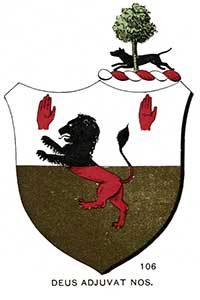The Daly Family

(Crest No. 106. Plate 14.)
THE Daly family is descended from Milesius, King of Spain, through the line of his son Heremon. The O’Dalys belonged to the Hy Nial tribe, founded by Nial the Great, or Nial of the Nine nostages, King of Ireland, A. D. 379. The founder of the family was Conal Gulban, son of Nial the Great. The ancient name was Siol N Dala, signifying “Offspring of Oath.” The chiefs of the O’Daly sept bore the title of Lords of Athlone, and their possessions were located in the modern Counties of Westmeath, Cavan, Longford, Galway and Roscommon.
The O’Dalys, according to some accounts, were a branch of the O’Donnells of Donegal, Princes of Tirconnell, whose tribe name was Clan Dalaigh. According to the Four Masters, the ancestor of the O’Dalys of Leath Cuinn was Adam, brother of Fargall, the one hundred and fifty-sixth Milesian monarch of Ireland. The O’Dalys, it appears, settled in Connaught as early as the twelfth century, and many of them are mentioned as very eminent poets and learned men, both in Connaught and Munster. They, with the O’Mulligans, were hereditary bards to the O’Reillys. Several of them were also distinguished as ecclesiastics. Among these may be mentioned Brother Dominic O’Daly, Bishop-elect of Coimbra, and historian of the Geraldines; Farrell O’Daly, the distinguished historian and ollav of Corcomroe, and Murray O’Daly, the poet of Lissadill, in Sligo. Brother Dominic O’Daly played an important part in the Portuguese Revolution of 1640, which freed that country from Spain and placed a Braganza on the throne of Portugal. He declined the Archbishopric of Braga in Portugal and Goa in India.
The Four Masters relate an incident of another O’Daly that throws a curious light on the men and manners of those days. Donnell More O’Donnell, the Lord of Tirconnell, sent one of his subalterns into Connaught to collect a tribute which he claimed from the people of the northern portion of that territory. The steward, who was a sullen, coarse and ignorant fellow, having visited the house of O’Daly, wounded the sensibilities of the poet, who, in an excess of passion, seized a battle axe and killed him. O’Donnell with a retinue of soldiers set out to capture the poet, who fled for protection to Clanricard, in Galway. Being closely pursued, he fled from thence to Limerick, from Limerick to Dublin, and from Dublin to Scotland, pursued meantime by the infuriated O’Donnell with his army, besieging towns and plundering the inhabitants in his march, in his effort to compel them to surrender the fugitive bard. On reaching Scotland O’Daly immediately composed three poems in praise of his pursuer and would-be slayer, which were so flattering that they placated O’Donnell and secured the poet’s pardon. In one of these poems O’Daly complains of the injustice of punishing him for such a trivial offense “as killing a clown who had insulted him.”
A branch of the O’Dalys were chiefs, and held large possessions also in the present Counties of Cork, Kerry and Limerick. These O’Dalys were hereditary poets and antiquaries to the MacCarthys and other great Munster families. Donough More O’Daly, a distinguished bard of the thirteenth century, was head of the O’Dalys of Finnyvarra, in the County of Clare. Many of his productions are of a high order of merit. “There is certainly no family,” writes Dr. O’Donovan, “to which the bardic literature of Ireland is more deeply indebted than that of O’Daly.” The Four Masters record the names of seventeen bards of this family, and O’Reilly, in his “Irish Writers,” twenty-eight. A descendant of the above-mentioned bard was Dennis Daly, a member of the
Irish Parliament, and intimate friend of Grattan. He was a man of great ability, being considered in some respects the equal of Flood, and his death was considered by Grattan an irreparable loss to Ireland.
Richard Daly, a native of Galway, was a theatrical manager, and noted duelist in the middle of the last century. He averaged for a time eight duels yearly. There are many highly respectable families of the name still in various parts of Ireland, as also in the United States and the British Colonies.
